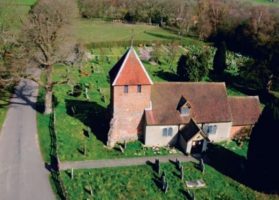Family
Thomas Rawlins (Rawlings) was born on 9 July 1897 in a tent in Staines, Middlesex (as recorded on his birth certificate) and was baptised on 19 September 1897 in Bentley, Alton, Hampshire, where the family were hop picking.
His parents were Thomas and Esther Rawlings (née Pike). Thomas was a ‘General Labourer’.
Thomas junior was the eldest son of ten children: Freedom ‘Freda’, Thomas, Patience, Noah, Mary, Esther ‘Ettie’, William ‘Billy’, Brittania, George and Liberty (male).
Although his birth and baptismal certificates state his family name was Rawlings, at the time of his enlistment and throughout his military career he was known as Rawlins. We believe the discrepancy in the spelling arises either because Thomas was unable to read or write or because his broad dialect disguised the correct spelling of his name.
The family were itinerant workers seeking seasonal employment where they could: agricultural work in Staines in July, hop picking at Bentley in September. Therefore the children may have had very little formal education. His father appears to have been illiterate as the 1911 Census is completed on Thomas senior’s behalf and Thomas junior’s birth certificate shows no father’s signature, merely his mark.
In 1861 the grandparents of Thomas junior, Moses and Amelia Rawlings, were living in Tadley, but by 1864 they had moved to Pamber Heath, occupying a small cottage on land between Burney Bit and Church Road.
In the 1891 Tadley Census Thomas’s father, grandfather and two uncles give their occupation as ‘Chimney Sweep’.
No 1901 Census return for Thomas junior or his parents has been found. However, in the 1911 census, aged 13 years, he and the family were recorded at Tilehurst, Berkshire. Thomas senior now listed his occupation as ‘Labourer and Dealer’.
Thomas was unmarried.
Service record
Thomas enlisted in Winchester. He served in the Queen’s (Royal West Surrey) Regiment (service number 243062). At some point he was with the 2/6th Essex Regiment (service number 7795) which went on to amalgamate with the Royal Fusiliers.
At the time of his death, he was a private in the 7th Battalion of the Royal Fusiliers (service number GS/67974), which was stationed on the Western Front from July 1916. During 1917 it was engaged in operations on the Ancre (11 January – 13 March), the final flickering of the 1916 Somme offensive where British troops sought localised tactical advantage on the heights above the valley of the River Ancre. The battalion was also engaged in the Battle of Arras (9 April – 16 May), the Third Battle of Ypres (31 July – 10 November), the action of Welsh Ridge, and the Cambrai operations (20 November – 30 December).
The Cambrai operations were a British attack, originally conceived as a very large scale raid, which employed new artillery techniques and massed tanks. Initially very successful, with large gains of ground being made, but German reserves brought the advance to a halt. Ten days later, a counter-attack regained much of the ground. Ultimately a disappointing and costly outcome, but Cambrai is now seen by historians as the blueprint for the successful ‘Hundred Days’ offensives of 1918.
Died
Thomas died of wounds in France on Monday 31 December 1917, aged 20.
Commemorated
Initially, Thomas was buried in the Caudry German Military Cemetery but was later reburied, prior to 1924, in Caudry British Cemetery [IV B 15], Caudry, France.
He is also remembered on Tadley War Memorial.
Decorations
Thomas was awarded the Victory medal and British War medal. These should have been sent to his family, but his medal card indicates they may not have been claimed and instead might have been disposed of.

